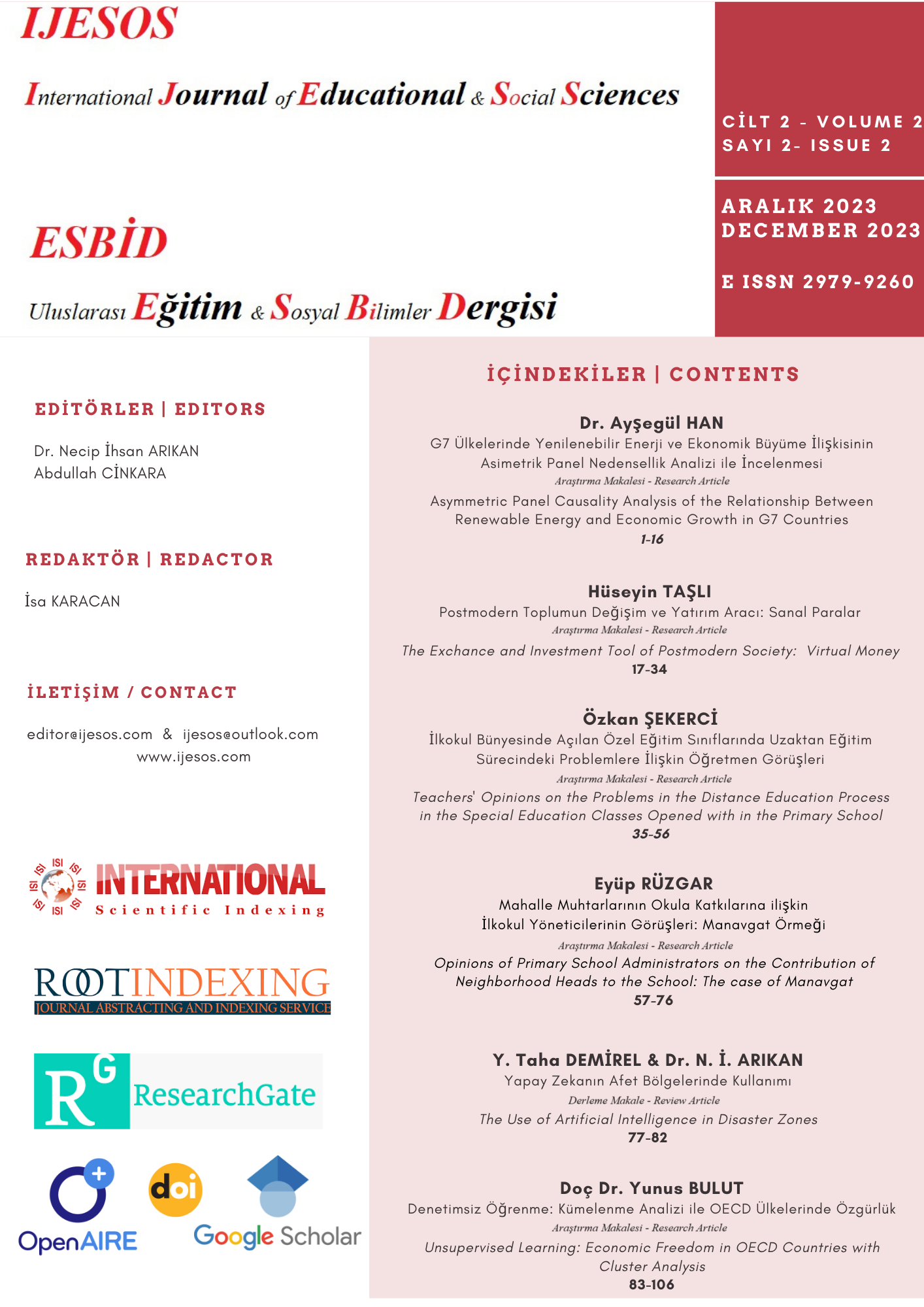Unsupervised Learning: Economic Freedom in OECD Countries with Cluster Analysis
DOI:
https://doi.org/10.5281/zenodo.10429529Keywords:
Unsupervised Learning, Clustering Analysis, Genetic Algorithm, Simulated Annealing, Levels of Economic FreedomAbstract
This study was carried out using cluster analysis, one of the unguided learning methods, to evaluate the economic freedom levels of OECD countries in 2023. With the optimal k value determined by using genetic algorithms and annealing simulation optimization algorithms, countries were examined with two different k-means clustering analyses. According to the results of the analysis, the annealing simulation method performed better than the genetic algorithm method. The high silhouette score indicates that the clusters formed by the simulated annealing method are more homogeneous and well separated from each other, while the low clustering error indicates that these clusters are closer and more distinct from the data points. The results of this study make an important contribution by providing a scientifically based approach to assessing levels of economic freedom and shaping future economic policies.
References
Alpar, R. (2017). Uygulamalı çok değişkenli istatistiksel yöntemler. Ankara: Detay Yayıncılık.
Boehmke, B., & Greenwell, B. (2020). Hands-on machine learning with R. Boca Raton: CRC Press, Taylor and Francis Group.
Everitt, B. S., Landau, S., Leese, M., & Stahl, D. (2011). Cluster analysis (5. b.). West Sussex: John Wiley & Sons Ltd.
Gülden, T., & Karakış, E. (2019). OECD Ülkelerinin ekonomik özgürlüklerine göre kümeleme analizi ile sınıflandırılması. S.C.Ü. İktisadi ve İdari Bilimler Dergisi, 20(2), 1-24.
Güler Kangallı, S., Uyar, U., & Buyrukoğlu, S. (2014). OECD ülkelerinde ekonomik özgürlük: bir kümeleme analizi. Uluslararası Alanya İşletme Fakültesi Dergisi, 95-109.
Johnson, R. A., & Wichern, D. W. (2007). Applied multivariate statistical analysis (6. b.). New Jersey: Pearson Prentice Hall.
Miles, M. A., Holmes, K. R., & O’Grady, M. A. (2006). 2006 index of economic freedom. New York: the Wall Street Journal.
Orend, B. (2006). Justifying socioeconomic right. R. E. Hessman, & C. E. Welch içinde, Economic rights in Canada and the United States (s. 25-40). USA: University of Pennsylvania.
Patry, W. (2009). Moral panics and the copyright wars. New York: Oxford University.
Sawaka, M. (2002). Foundations of genetic algorithms. Genetic algorithms and fuzzy multiobjective optimization (s. 11-27). içinde Boston: Springer.
Scitovski, R., Sabo, K., Martínez-Álvarez, F., & Ungar, Š. (2021). Cluster analysis and applications. Gewerbestrasse: Springer.
Urmak Akçakaya , E. D., & Ömürbek, N. (2021). OECD ülkelerinin demokrasi kalitesi göstergeleri açısından kümelenmesi. Uluslararası Toplum Araştırmaları Dergisi, 1365-1393.
Yeniay, Ö. (2001). An overview of genetic algorithms. Anadolu Üniversitesi Bilim ve Teknoloji Dergisi, 2(1), 37-49.
Zeebaree, D. Q., Haron, H., Abdulazeez, A. M., & Zeebaree, S. R. (2017). Combination of K-means clustering with genetic algorithm: A review. International Journal of Applied Engineering Research, 14238-14245.
Zhang, Y., Gao, H., Zheng, H., Li, R., & Ma, Y. (2023). Research on base station location based on k-means clustering and simulated annealing. Electronics and Computer Applications (ICPECA) (s. 1654-1660). Shenyang, China: 2023 IEEE 3rd International Conference on Power.
Zhou, A.-H., Zhu, L.-P., Hu, B., Deng, S., Song, Y., Qiu, H., & Pan, S. (2019). Traveling-salesman-problem algorithm based on simulated annealing and gene-expression programming. Information, 10(1), 1-15.
Downloads
Published
How to Cite
Issue
Section
License
Copyright (c) 2023 International Journal of Educational and Social Sciences

This work is licensed under a Creative Commons Attribution 4.0 International License.


